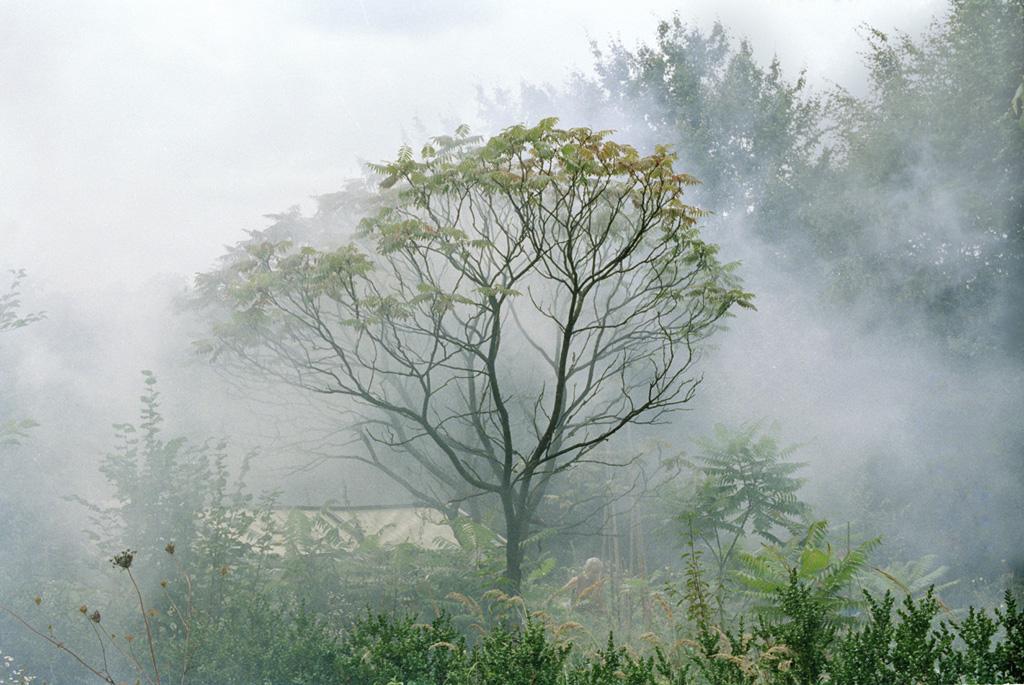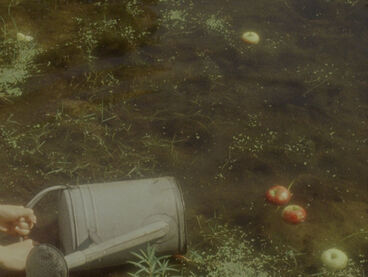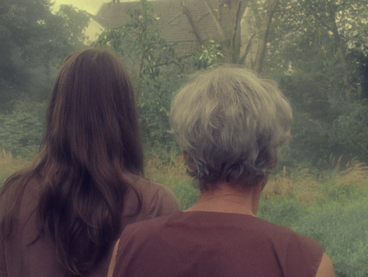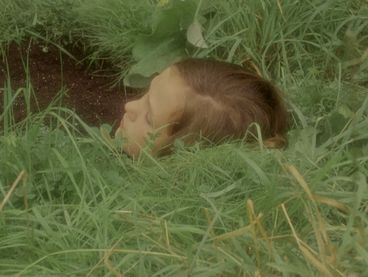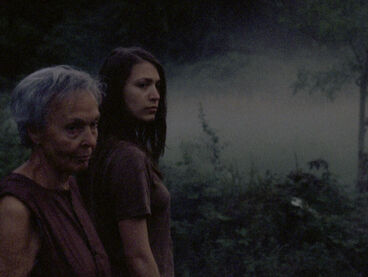MOOZ – audiovisual arts collection
Anfang Juni
2012, 11:04 min., color, sound, (Beginning of June)
Screenplay/direction/editing: Kerstin Neuwirth
Camera: Simon Rittmeier
Actors/Actresses: Asja Holl, Irina Potapenko, Ingrid Neuwirth, and Jürgen Sarkiss
Production design: Sarah Mitter
Costumes: Rebecca Still
Production management: Hamed Mohammadi
Sound editing: Franziska Windisch
Production: Academy of Media Arts Cologne
Wucherndes Kino (Rampant Cinema)
Sometimes it makes sense to imagine the cinema screen not as a white surface on which something is projected. In encountering Kerstin Neuwirth’s Anfang Juni, for example, it seems to be more of a thickly woven growth of rich green leaves, stalks, and branches, which in their mycelium-like overgrowth produce a surface that need not be imbued with light but should rather be penetrated by our gaze. Not on the surface, but behind or under it, there opens a world that is a garden, where space and time follow other laws that don’t connect with each other in a logically understandable way nor do they proceed chronologically, they instead fall into each other, dissolve, or enter into absurd, confusing relationships.
There is an old woman, who tends a garden bed in proximity to a house circled by this verdant greenery; a young girl who lies buried in a lush hollow in the ground, with just her head poking out, like—yes, exactly—a head of lettuce; and a middle-aged woman, observing it all—or perhaps just the abandoned yard? Anfang Juni tells of something: the temporal layers and spatial divisions—the garden bed, a pond, the house—relate to each other, they indicate a connection, a meaning, if you will. And yet the experience of seeing the film is also so much like pure cinema: colors and forms in motion, banks of fog and light reflections, buzzing, rustling, the snip of rusty garden shears, sensuous impressions that are above all interwoven through gazes and floating camera movements. The film is a place that you enter so that you are in it with your whole body, breathing, feeling, more than merely seeing.
The girl runs out of the garden with a man (her father?) around a wooded lake that appears to lie at the center of this dense, intricate film. Darkened and vibrating, her reflection glides over the lake’s surface and thus brings a further space into the film. Nicolas Roeg’s Don’t Look Now (1973), in which the death of the girl in the red raincoat is anticipated with exactly this image, only to later haunt all spaces and times forever, over and over. All of cinema, the history of its images, is an enchanted garden in which films branch out, entangle, disappear from view, and at some point appear again, only to sprout in discrete images new, often also somber blossoms.
Text - Alejandro Bachmann
Kerstin Neuwirth was born in Kärnten, Austria. She initially studied art history and Romance studies at the University of Vienna. She later completed studies in film at the Academy of Media Arts Cologne. Her short films, including Anfang Juni and Die Bergfrau, have screened at international festivals. For Anfang Juni she received the Promotion Award of the NRW Competition at the International Short Film Festival Oberhausen. In 2014, she received the Promotion Award of the State of North Rhine-Westphalia in the film category. Currently she is working on her debut film ABITANTI. Kerstin Neuwirth lives and works as a freelance filmmaker and casting director in Cologne.



